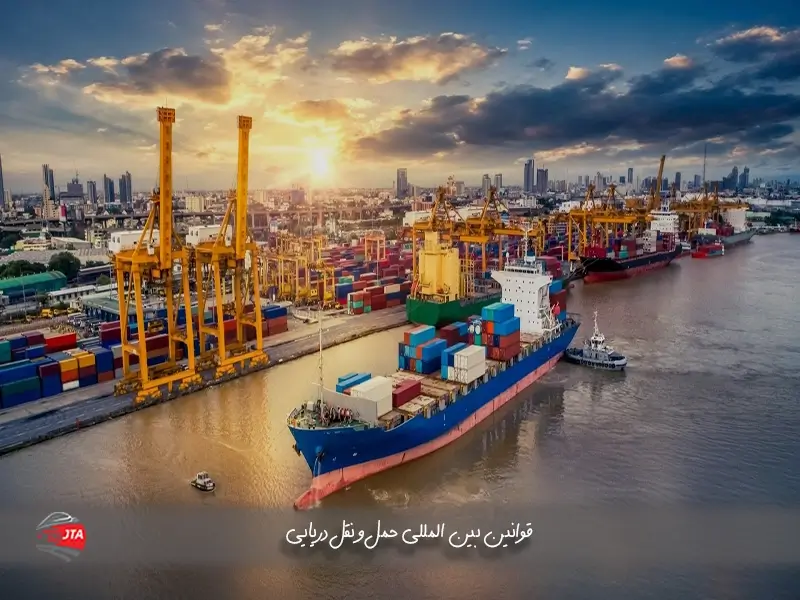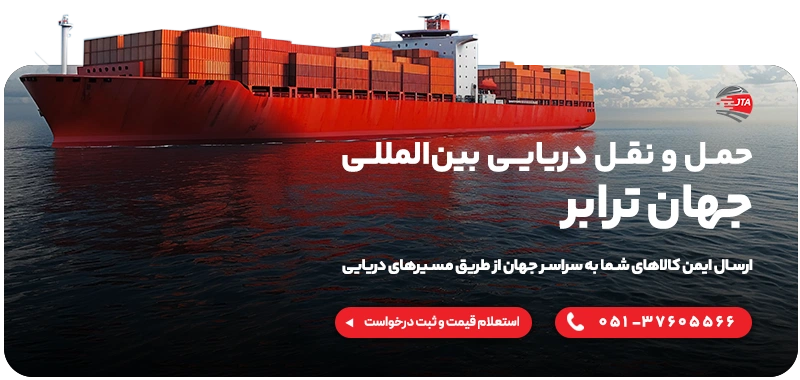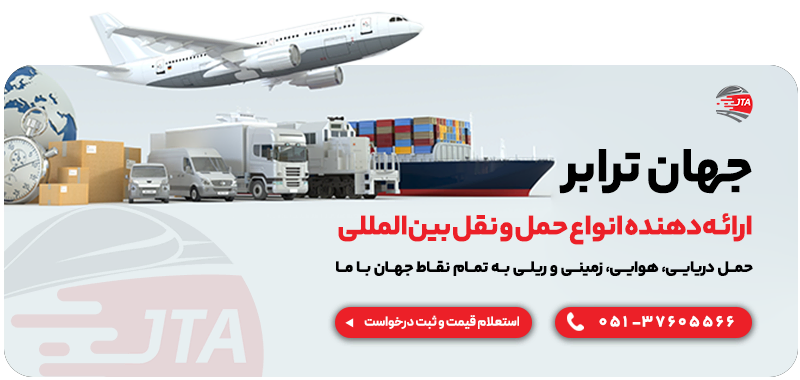فهرست مطالب
ToggleWhat are the international maritime transport laws and their importance in global trade?
International maritime transport plays a crucial role in global trade as one of the most important methods of transporting goods worldwide. By utilizing extensive maritime capacities, international shipping facilitates economic connections between countries and effectively manages the flow of goods. In this context, companies like Jahan tarabar, with their experience and expertise in the field, have become key players in international transport, ensuring the safety and efficiency of maritime shipping by adhering to international laws and standards.
The Role of Maritime Transport Laws in Global Trade
International maritime transport laws have significantly contributed to improving the efficiency and safety of shipping. In global trade, countries collaborate to establish legal agreements and develop common laws, ensuring smooth business activities with minimal risk. For example, the United Nations Convention on the Law of the Sea (UNCLOS) and the International Convention for the Safety of Life at Sea (SOLAS) allow member countries to benefit from uniform international regulations. These standards include safety and environmental restrictions that protect not only maritime operations but also the entire global supply chain.
Impact of International Maritime Transport Laws on the Environment
Environmental protection is of utmost importance in maritime transport. Pollution from oil spills and marine waste can cause irreparable damage to marine ecosystems. To prevent such harm, the MARPOL Convention has been established, setting regulations for ships to reduce pollution and manage waste. Every vessel is required to adhere to standards for fuel management and waste disposal, helping to reduce pollutants in the oceans.

Key International Maritime Transport Laws
International maritime transport laws consist of a set of regulations and treaties established through international agreements, which are binding for member countries and companies engaged in international shipping, such as Jahan tarabar. Some of the most important laws and regulations include:
- United Nations Convention on the Law of the Sea (UNCLOS): This is one of the most comprehensive international treaties that sets the legal framework for the use of seas and oceans. UNCLOS addresses issues such as the definition of maritime zones (territorial waters, high seas, exclusive economic zones, etc.), the rights to natural resources, and the laws governing ships’ passage through international waters.
- International Convention for the Safety of Life at Sea (SOLAS): This is one of the most crucial international treaties concerning the safety of ships. It establishes standards for the safety of vessels, passengers, and cargo. SOLAS outlines regulations related to safety equipment, crew training, and emergency procedures.
- International Convention for the Prevention of Pollution from Ships (MARPOL): This convention aims to reduce and prevent pollution caused by ships. MARPOL includes regulations to prevent oil spills, waste, and chemical discharges into seas and oceans.
- Hague-Visby Rules: These rules govern the responsibility of maritime carriers regarding the cargo they transport. Under these laws, shipping companies are required to compensate for damages to the cargo if negligence on their part is proven.
Impact of Technology on International Maritime Transport Laws
Modern technologies have significantly improved safety and compliance with maritime transport regulations. The use of satellite tracking systems and smart ship technologies has enabled continuous monitoring of weather conditions, ship locations, and cargo status. Additionally, new technologies help prevent environmental pollution and maritime accidents. With intelligent systems, ships can choose safer and more optimized routes, reducing the risk of maritime collisions.
Comprehensive Restrictions in Maritime Transport
Maritime transport restrictions depend on various factors, including safety, environmental, and international laws. Some of these restrictions include:
- Environmental Restrictions: Due to growing concerns over climate change and marine pollution, stringent environmental regulations have been implemented for maritime transport. Under these regulations, ships are required to use technologies that minimize oil, gas, and waste pollution in the seas.
- Safety Restrictions: Safety regulations cover areas such as ship technical conditions, crew training, life-saving equipment, and emergency response procedures. To prevent maritime accidents such as sinking or fire on ships, international organizations enforce strict regulations.
- Legal and Commercial Restrictions: Countries must respect and adhere to international laws. These laws include commercial rights and obligations for transporting goods, responsibilities related to ship collisions, and legal matters related to passengers’ rights and the responsibilities of transport companies.
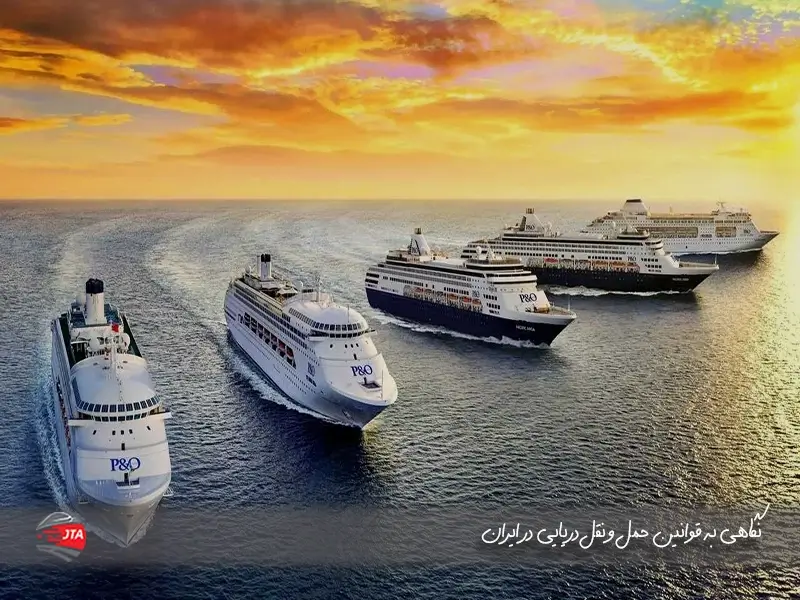
Overview of Maritime Transport Laws in Iran
As a country situated on the shores of the Caspian Sea and the Persian Gulf, Iran holds significant importance in maritime transport. Iran’s Maritime Law, enacted in 1964, provides a legal framework for regulating maritime transport activities in the country. This law addresses various issues such as the safety of vessels, the rights and responsibilities of ship owners and transport companies, the loading and unloading of goods, and maritime damages.
In Iran, the Ports and Maritime Organization (PMO) is the primary authority responsible for enforcing maritime transport laws and regulations. This organization oversees issuing permits, ensuring vessel safety, and monitoring ship arrivals and departures at Iranian ports. Iran’s maritime cargo regulations include both national and international rules that govern the management and regulation of maritime transport activities and the movement of goods through waterways. These laws define various aspects of maritime transport, including ship safety, cargo handling, insurance, and the responsibilities of transport companies. Some of the key regulations are as follows:
- Iranian Maritime Law (1964): This is the most important national law in the field of maritime transport, outlining the rights and obligations related to shipping, vessels, crews, cargo owners, and passengers. Key provisions of this law include handling maritime damages, responsibilities related to maritime accidents such as collisions and shipwrecks, and regulations for cargo and passenger insurance. The law also addresses vessel registration, maritime safety, and technical standards for ships.
- Customs Regulations and Port Tariffs: Another key regulation in Iran’s maritime transport system is the customs law and port tariffs. These laws oversee the import and export processes through the country’s ports and determine specific costs and tariffs based on the volume, type of goods, and destination. Port tariffs cover docking, loading and unloading, and additional port services.
- Regulations on the Liability of Transport Companies: According to Iranian Maritime Law and international conventions like the Hague-Visby Rules, maritime transport companies are held responsible for damages to cargo during transport. These companies are required to compensate for damages unless they can prove the loss was caused by factors beyond their control, such as weather conditions or collisions resulting from force majeure.
- Maritime Insurance Laws: Maritime insurance is a crucial part of Iran’s maritime transport regulations. All maritime transport companies must maintain comprehensive insurance to cover potential damages to ships, cargo, and passengers. These insurance policies are designed to compensate for costs arising from maritime incidents, such as cargo damage, shipwrecks, or environmental pollution.
- Safety Regulations and Ship Standards: Ships operating in and out of Iranian ports must comply with specific safety standards. The Ports and Maritime Organization is responsible for monitoring these regulations, which include safety equipment, loading and unloading procedures, crew training, and emergency response measures.
- International Conventions: As a member state of the International Maritime Organization (IMO), Iran is committed to adhering to major international conventions, including the SOLAS Convention (Safety of Life at Sea), the MARPOL Convention (Prevention of Pollution from Ships), and the UNCLOS (United Nations Convention on the Law of the Sea). These conventions provide a global framework for regulating maritime transport, ensuring safety, and protecting the environment.
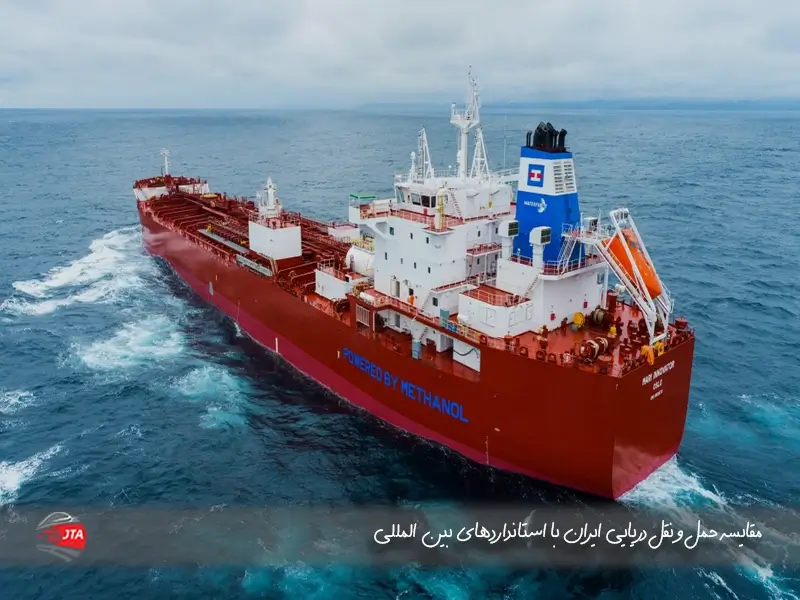
Comparison of Iran’s Maritime Transport with International Standards
As an active maritime country in the region, Iran has always sought to implement international standards in its maritime transport system. Iranian national laws are often directly influenced by or modified based on international conventions. These efforts are crucial for maintaining competitiveness in the global arena and improving safety and quality in the country’s transport sector.
Common International Maritime Transport Regulations
One of the primary goals of international maritime transport laws is to establish a shared legal framework for all countries. These regulations allow nations to conduct their commercial and maritime transport activities within a standardized and organized structure. Some of these regulations include:
- Hague-Visby Rules: These internationally recognized rules determine the rights and responsibilities of maritime transport companies and cargo owners. The rules govern aspects like liability for cargo damage and loss during transport.
- International Transit Laws: Many countries rely on international waterways to transport goods. International transit regulations allow these nations to legally pass goods through the territories of other countries, ensuring that international trade flows smoothly.
- Passenger Transport Regulations: International laws such as the Athens Convention regulate the rights and responsibilities of shipping companies towards sea passengers. These laws cover aspects like passenger insurance, compensation in case of accidents, and passenger safety measures.
Challenges of Maritime Transport in Combating Illegal Transit
One of the major challenges in maritime transport is combating illegal transportation activities, including smuggling goods, drug trafficking, arms shipments, and maritime terrorism. International laws provide countries with the tools to implement tighter border controls and enforce safety regulations to prevent illegal activities.
Conventions like UNCLOS (United Nations Convention on the Law of the Sea) and SOLAS (Safety of Life at Sea) offer legal frameworks to prevent illegal transport, and countries are required to adhere to these rules. International cooperation and the use of advanced technologies such as satellite monitoring systems also play an important role in preventing illegal activities in maritime transport.
Iran’s Alignment with International Standards
Iran has made significant progress in aligning its national regulations with international maritime conventions, ensuring compliance with frameworks such as SOLAS and MARPOL, and working towards stricter enforcement of maritime safety and environmental standards. While challenges like illegal trafficking and technological gaps remain, Iran’s commitment to international agreements plays a key role in enhancing the quality and competitiveness of its maritime transport sector.
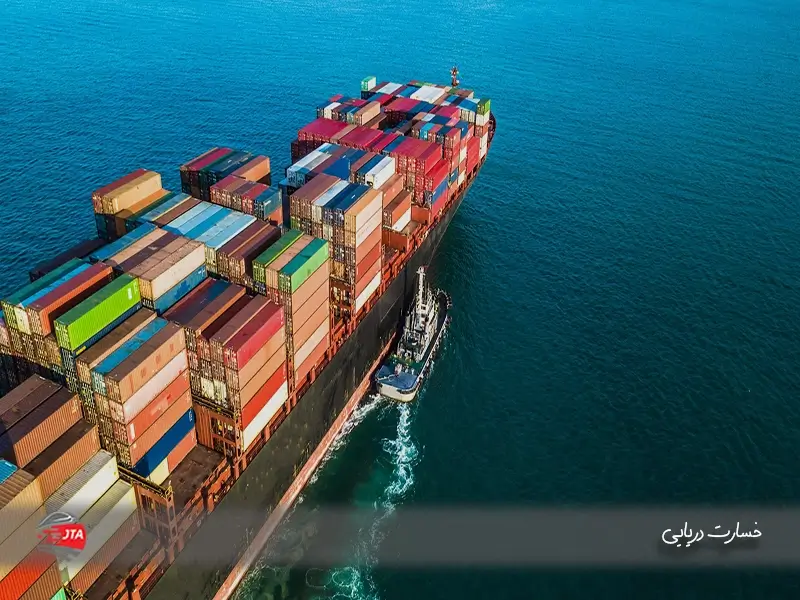
Maritime Damage
Maritime damage is one of the most important aspects of maritime transport, arising from various factors. Ships are constantly exposed to harsh marine conditions that can damage cargo, ships, and even passengers. These damages may occur due to adverse weather conditions, technical failures, human errors, or even collisions between ships. International conventions such as the Hague-Visby Rules and the Athens Convention address the responsibilities of parties involved in maritime damage incidents. These laws regulate the rights of shipping companies, cargo owners, and even passengers when maritime damage occurs.
For example, in the event of a collision between ships, transport companies are obligated to compensate for damages to cargo, passengers, and the involved ships. In such cases, maritime insurance plays a crucial role in covering these damages. Many transport companies use comprehensive maritime insurance to protect themselves financially in the event of such incidents.
Some examples of maritime damage include:
- Cargo Damage: Damage or destruction of goods due to adverse weather, collision, or equipment failure.
- Ship Damage: Technical and mechanical damage to the ship’s structure or equipment.
- Environmental Damage: When pollution, such as oil spills from ships, contaminates the sea, the transport companies bear significant responsibility.
Passenger damage is also an important issue covered by maritime transport laws. In case of any accident leading to passenger injury or death, shipping companies are required to provide compensation. Maritime transport companies are obligated to compensate for damages, and many of them use maritime insurance to cover such costs.
Tonnage Measurement Convention
The Tonnage Measurement Convention is one of the key regulations in maritime transport. This convention determines the gross and net tonnage of ships, and these measurements are used for calculating port charges, taxes, and other related costs.
Conclusion
International maritime transport laws play a vital role in ensuring the safety and efficiency of global transportation. These laws not only help maintain security and prevent risks, but also protect the rights of passengers and traders from damages and legal issues. For countries like Iran, which conduct a significant portion of their trade through the sea, adhering to these laws and complying with relevant restrictions is essential.


